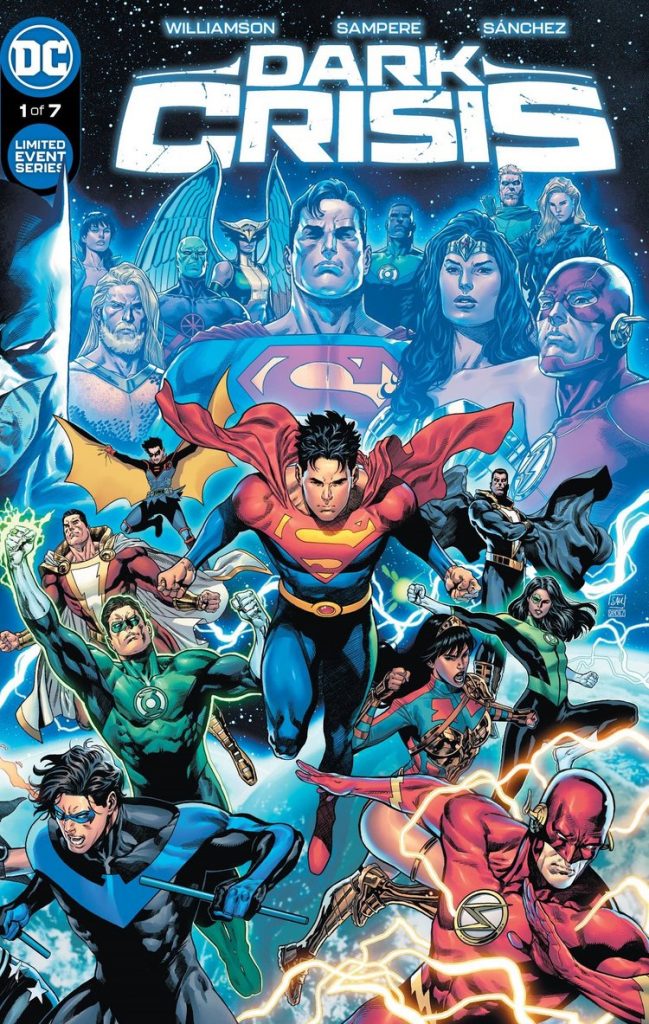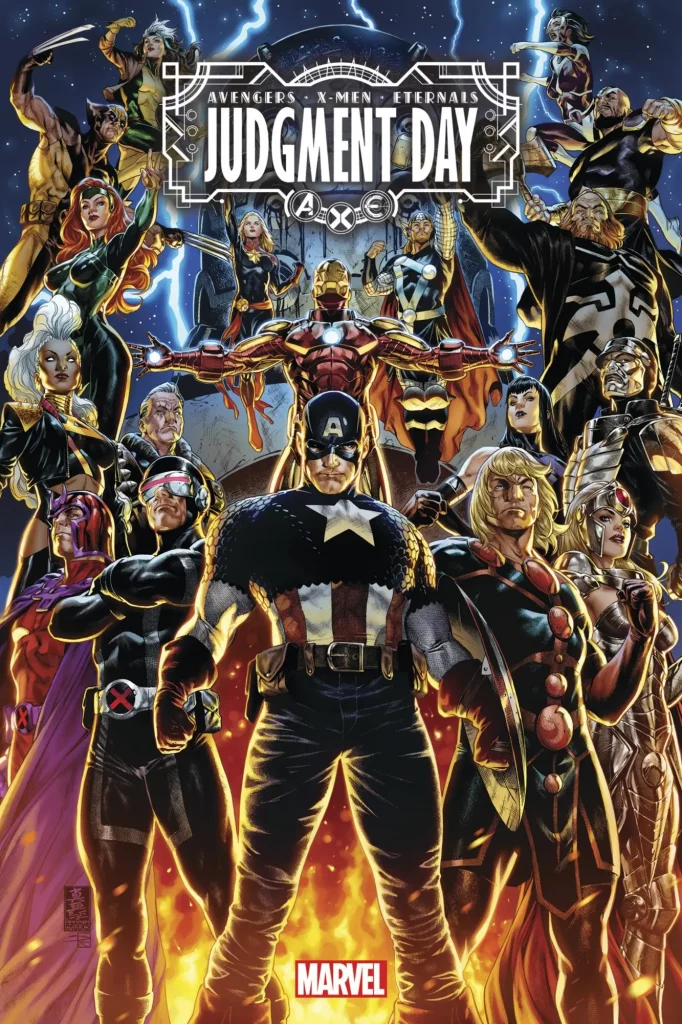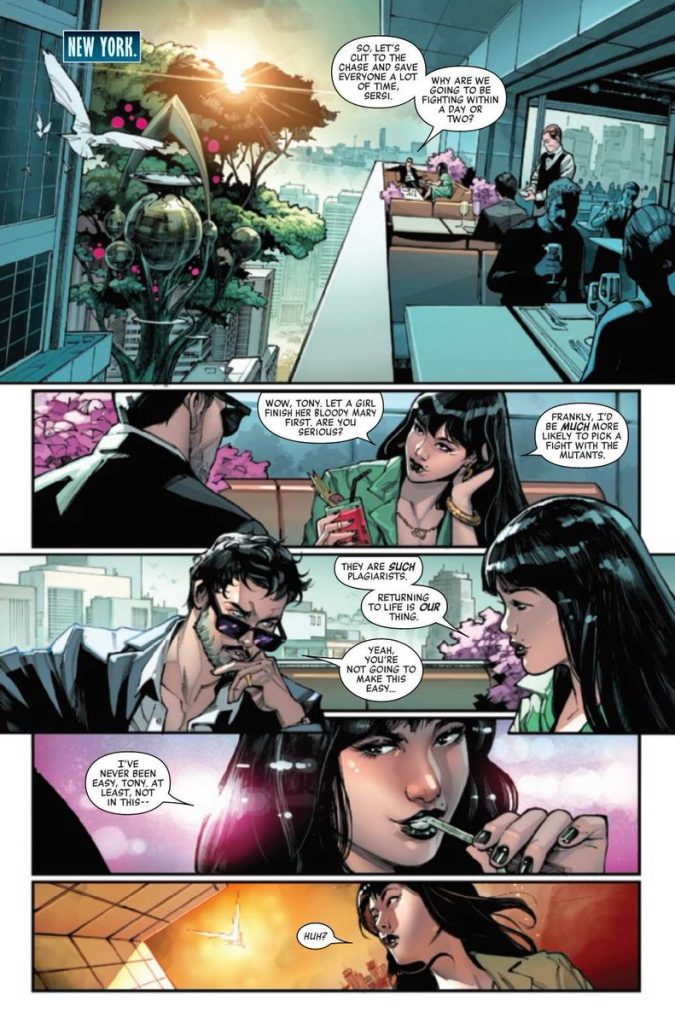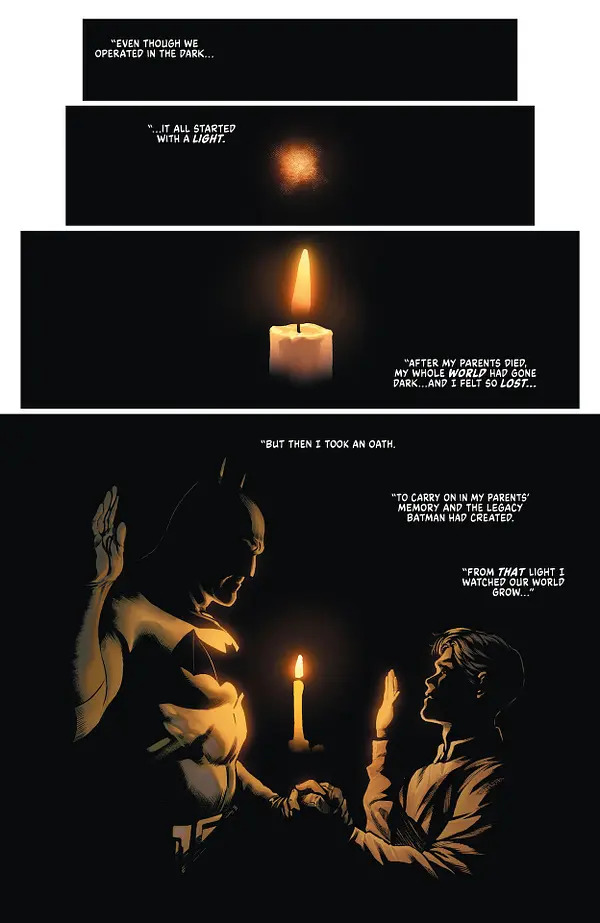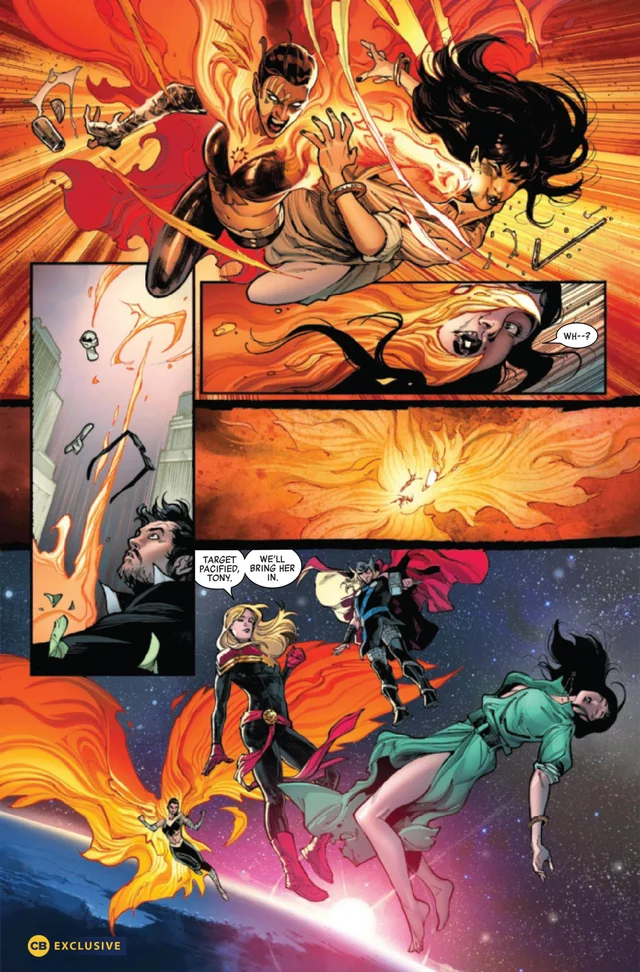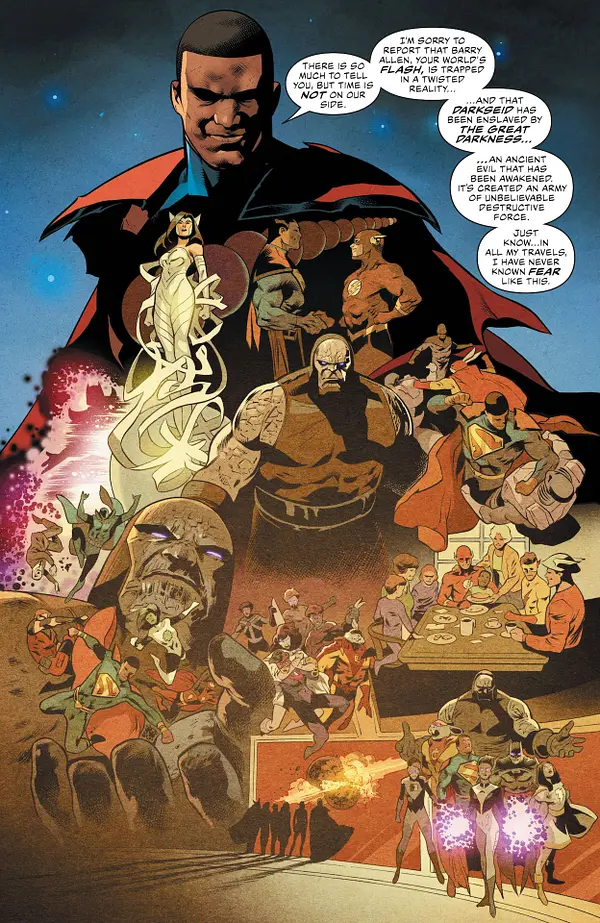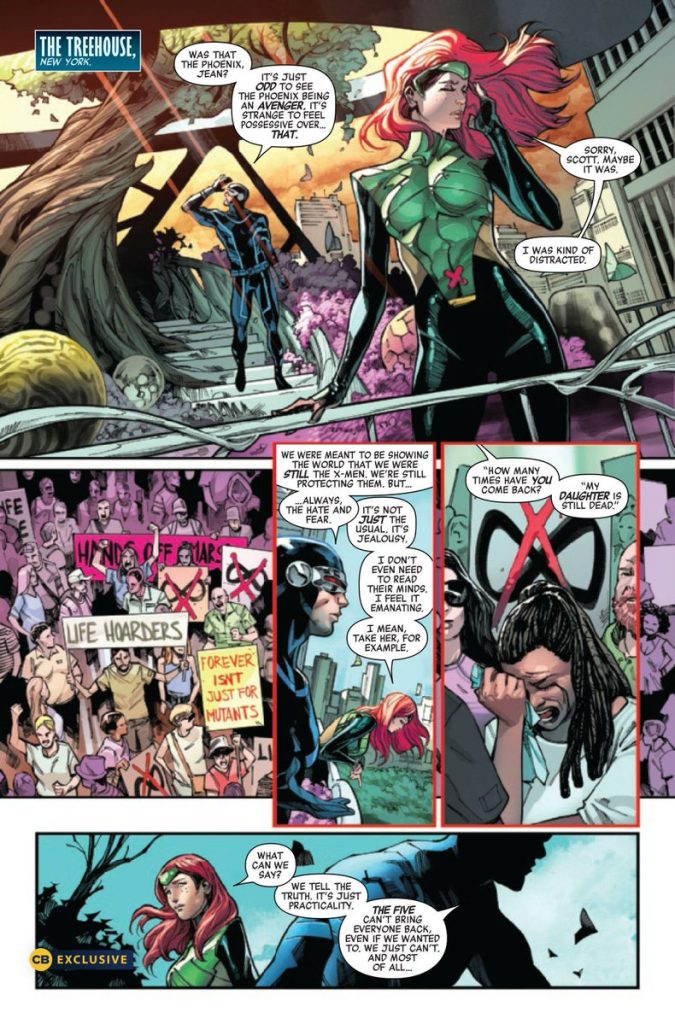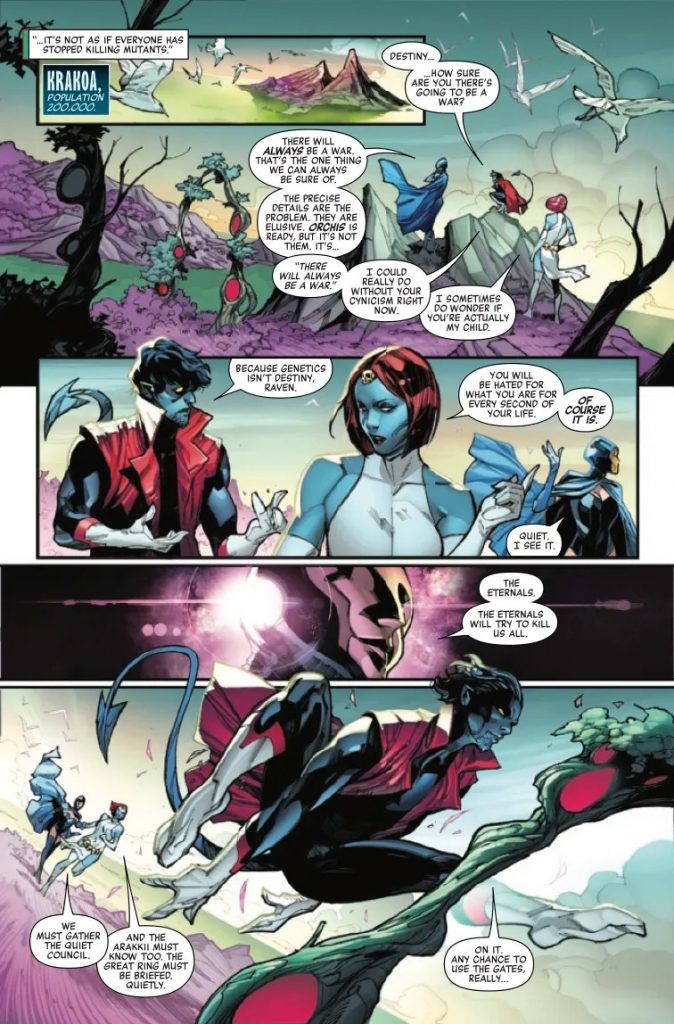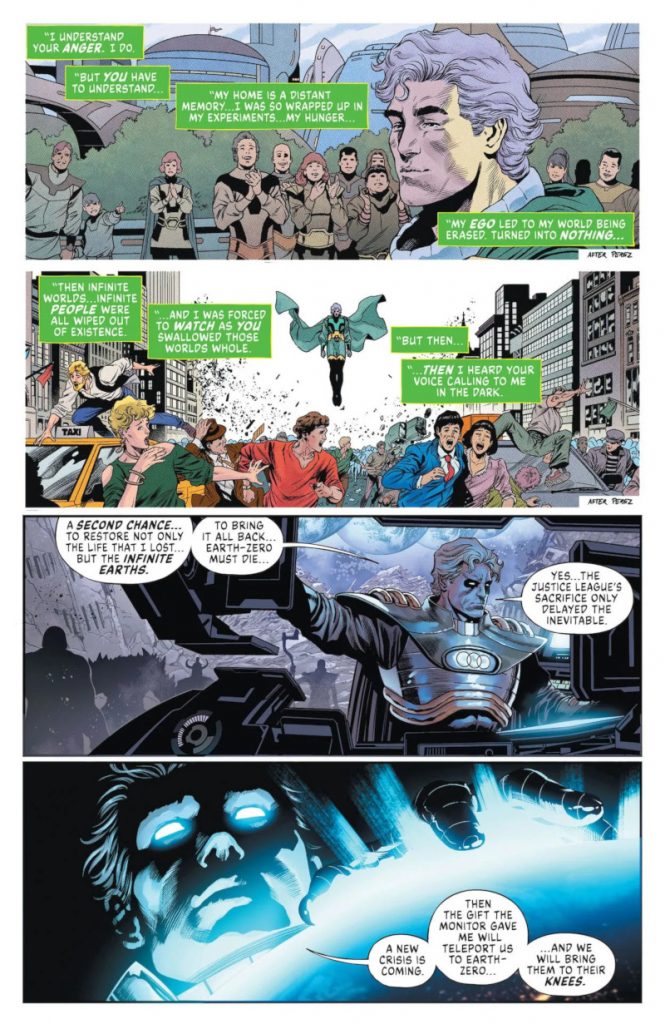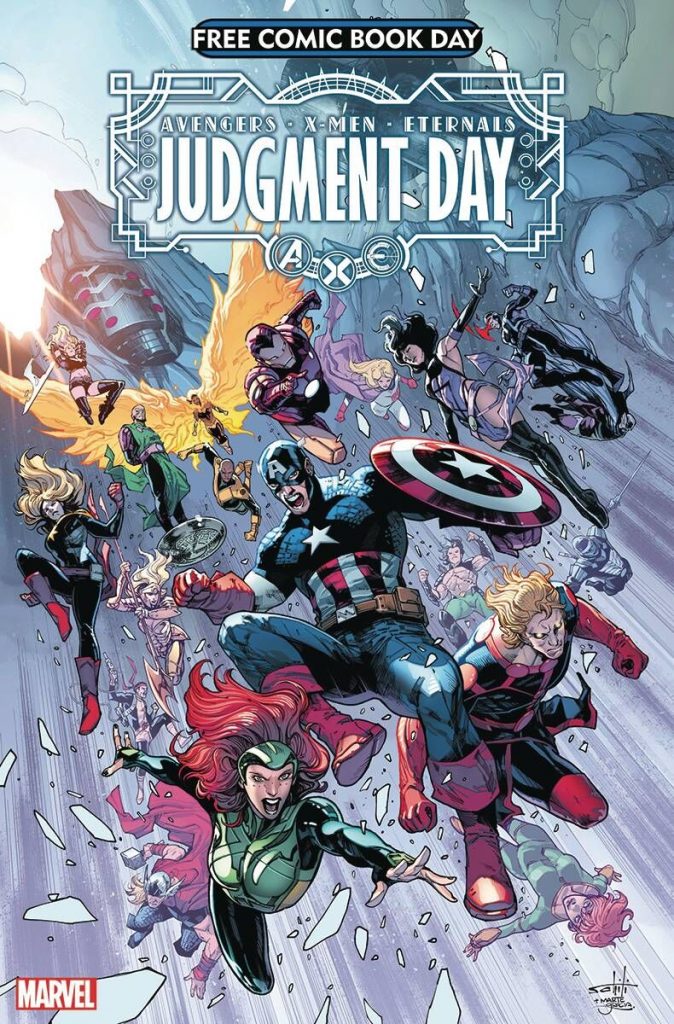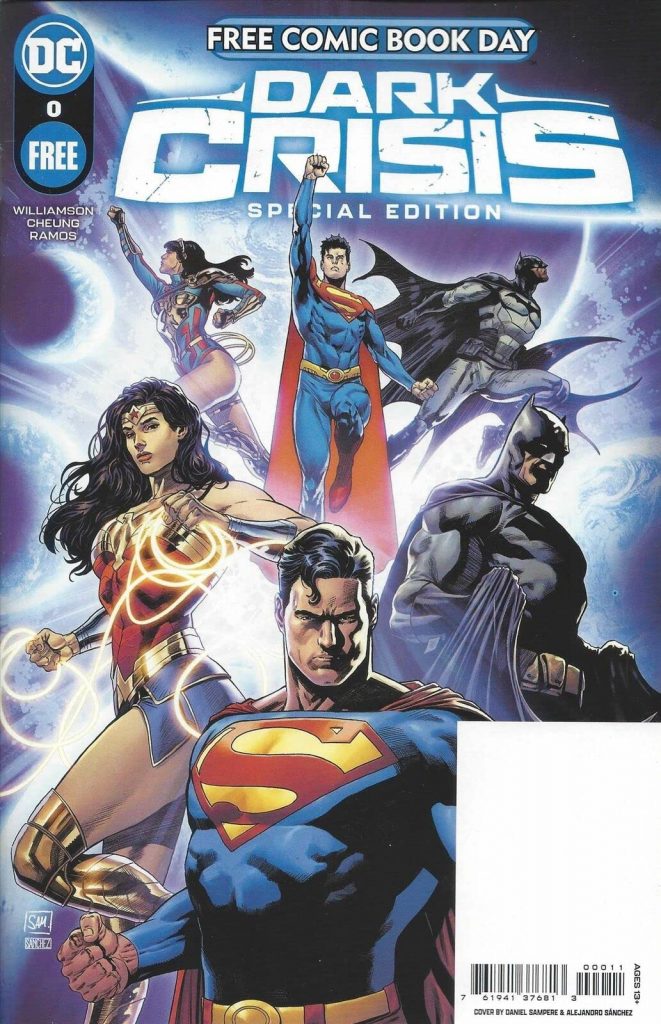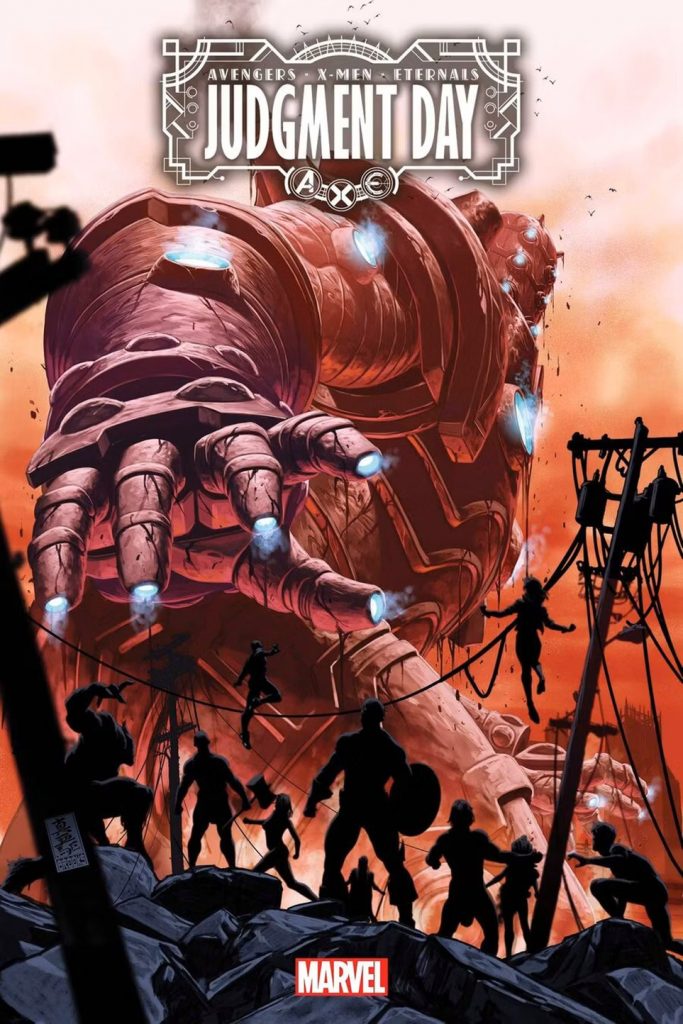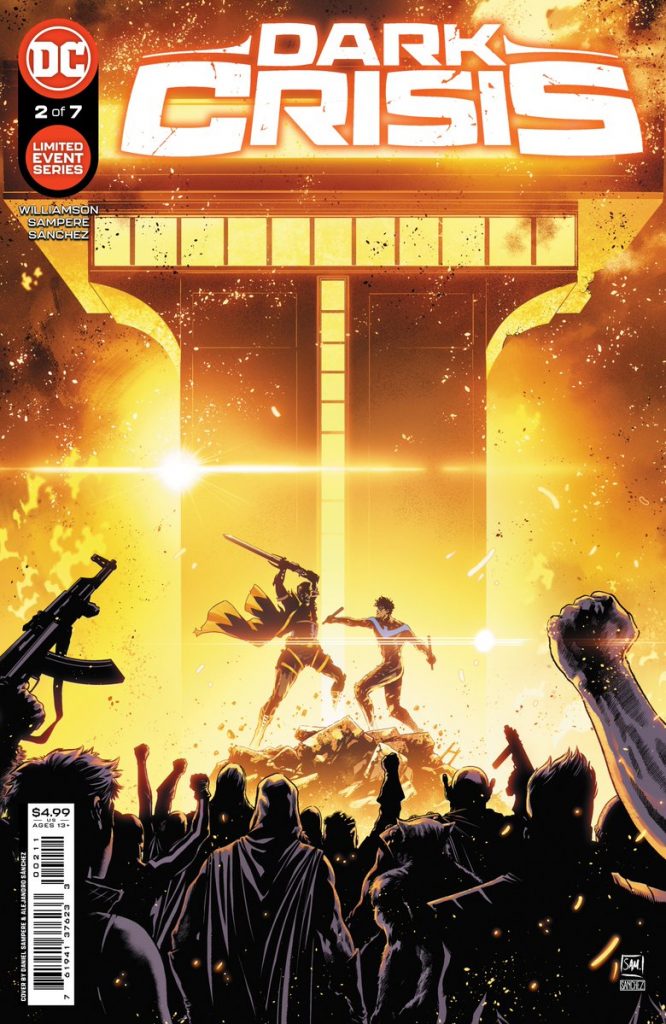On Panel: Joshua Williamson and Kieron Gillen on the Ways of the Event Comic
On Panel is a monthly, text-only sister series to Off Panel, my weekly comics interview podcast, in which each interview features two or more guests as I attempt to simulate the idea of a panel conversation from a conversation. By that I mean it’s a moderator – myself – guiding a free-flowing conversation between multiple panelists about a subject that unites them. It’s meant to be less of a traditional interview and more of a back-and-forth between myself and the guests or the guests themselves, as we talk about a central premise while discussing connected ideas in the process.
Event comics are curious things.
Simultaneously acting as endings for larger stories and transition points into whatever is next for a superhero universe, events can be both magical and overwhelming, depending on who you ask. That isn’t just for readers, but the creators as well. These ultra-crossovers are monstrous undertakings, in which you aren’t just telling a story, but guiding an entire universe. At least, that’s what it seemed like from the outside. I’ve always loved them, at least conceptually, but I’ve never had a good feeling for just how intense that experience must be for those bringing them to life in front of our very eyes.
Until now.
With both DC and Marvel simultaneously rolling out line-wide events built off long-running stories within their universes, I thought it was the right time to learn just what it takes to tell one of these stories. To do that, I recently had a conversation over two sessions on Zoom with the writers of those events in Joshua Williamson (Dark Crisis, an exploration of what happens after the Justice League died and what death means in the DC Universe) and Kieron Gillen (A.X.E.: Judgment Day, a showdown between the Avengers, X-Men, and Eternals). It’s a talk about what writing and leading one of these uber-stories truly entails, as Williamson and Gillen discuss their thoughts on the art of the event, what goes into connecting all of the dots, focusing your efforts, universal needs, the importance of “gets,” their approaches to these stories, and much, much more.
It’s a gigantic, entertaining conversation, and one in which this pair sheds light on how difficult (and rewarding) this task can be. I think you might enjoy it. This conversation has been edited for length and clarity, and is not focused on plot, so spoilers are limited outside of a quick discussion about a conversation that takes place in Dark Crisis #3.
I know Josh loves events. But Kieron, do you like events, or at least the idea of them?
Kieron: Like is a strong word. I don’t like anything. (laughs) In terms of the Western comics medium, events are something that only we have. When I first saw the first Avengers movie, there was a moment when I realized, “Oh no, they’ve done a crossover. I’ve never seen this before.” And they’ve still haven’t really done an event in the way that we do events. The idea that they’re going to release three movies at once and they’ll tie into a central movie. It’s really bizarre.
On an intellectual curiosity level, it’s beyond good and evil. They exist, in which case you want to take it seriously as a form. I’ve deftly avoided the question there. But at the same time, if you go about it, you think back to some of the biggest beats of stuff I’ve liked as a kid, like hell yeah, they’re events. Original Secret Wars is probably one of my first introductions to most of Marvel, and Infinity Gauntlet gave me the rest. You can’t take that away. Talk about people who came in the noughties, Civil War was such a huge thing for Marvel in that way.
So, like them or hate them, it is beyond good or evil with them. They’re just what they are. (laughs)
Joshua: That’s a really good way to put it. They’re going to happen.
It’s funny. I love them and I hate them. There’s a part of me that professionally has different feelings on them than me as a fan. I’m not going to say what it was, but I found myself complaining about something that was around an event that I had just done. (laughs) It was something that I had just made the same…I’m not going to say a mistake, but I had done something that I was like, “Oh, but that’s part of what you do when you’re doing events.”
But there was a part of me that was like, “Oh, why’d they do that?” And then I realized, “Oh, well, I literally just did that.”
This is one question I had for you. When you are working on the events, do you take yourself back and think about how you were when you were young going into those events for the first time? Do you ever take a step back and come at it from the fan version versus the professional for the last 20 years version of you?
Kieron: That’s interesting. I think the word sincerity keeps on coming to mind. One of the ways events break is that people come into them cynically. And at least a lot of what I’m trying to do in A.X.E is to buy some-
Joshua: I’m glad to hear your call it A.X.E as well, because I always call it A.X.E.
Kieron: I call it Judgment Day, but I’ve leaned into A.X.E now. I can’t win. It was pitched at Judgment Day. (laugh) And it’s like, “No, A.X.E. it”
But a certain part of the audience (being) so cynical about events means that a lot of what I’m trying to do is trying to encourage to someone, “You can believe in this.” And that people have to make the leap of faith. Even if you know things aren’t going to change or are going to change, you’ve still got to act like it’s real. You have to believe it and the characters have to believe it.
You’re talking about studying events. I remember when Thanos kills everyone in the Marvel Universe in Infinity Gauntlet and he kills them all in brutal and horrible ways. You knew they’re not going to keep these characters dead but at the same time you knew this is such an incredible moment. And both these things are true. So, there is part of me that I am thinking about, “Okay, I want to hit those beats. I want to hit these things that affected me like this.”
And then of course my writer brain and then I’m like, “Okay, how do you do that though?” And that’s the two sides of it: what moves you and then how were you moved? And they’re the two things I try to balance. What about you?
Joshua: It’s the same thing. I think that’s what a lot of what Dark Crisis ended up being about, me trying to deal with some of that stuff. I kill the Justice League in the prelude issue. And we all know that that’s not going to stick. We all know this. But you have to go into it with like-
Kieron: What?! Spoilers. (laughs)
Joshua: Yeah, spoilers. (laughs)
I have this thing I think about a lot when I’m writing, especially when I’m writing superhero books. I try to take a step back and think about how the conversations we have about superheroes, at this point, the superheroes must also be having in their world. And we were in all these summits over the years, and things would come up. And one of them was this timeline of all the characters’ histories, this big wall of a timeline.
And I was looking at it and I realized, “Oh my gosh, all of these characters have died multiple times, and some of them died really close to each other.” But almost all of them died within our ten-year time span in some ways. At some point, are they going to talk about that? When are they going to talk about, “We’ve all died,” and what does that actually mean? And do some of them believe it and some not?
So, I started really getting into that a bit and trying to find ways of looking at it from the character’s perspectives and then looking at it from the professional perspective of, “Okay, it’s an event. What are the things I need to do?” But then I take a step back and I go, “What are the things that I actually cared about before? And what do I care about now?” Working on an event, I have to slow down and look at it from all kinds of perspectives.
The fan perspective. The pro perspective. I hate to say the financial perspective, even though that is definitely a piece of this, right? But then I try to put myself in the story as one of the characters and look at it from their perspective. I try to balance all those pieces out. It’s funny, I’m sure you’ve had these moments before in writing, but the other day I was working on the couch in the living room, and I suddenly had this emotional moment with the story. I’m working on a particular scene, and I started feeling emotional about it. It just got me. And I’m like, “Okay, this scene is working.”
I think that’s what I’m always searching for at the end of the day. It’s not just the big explosions or the professional, “Oh ho ho, I figured this one out.” I try to find those emotional moments. Whenever I can find those, that’s what I try to key on. While I’m writing it, if I’m getting emotional writing it, that’s where I’m like, “Okay.” And I mean happy, sad, whatever. I try to hunt for those moments.
Kieron: When people say they’ve cried over my work, that’s normally the stuff I’ve cried over. Me getting upset is absolutely the “I’ve hit gold here, carry on digging.” And I always talk about the second I think of a story idea that upsets me, it’s like, “Okay, that one’s happening.”
Joshua: That’s what it is, right? Our job is supposed to make people react and feel engaged, and that can go with a large range. That can be happiness and sadness and anger and all of that. But if I’m getting that out of you, then I’m doing my job correctly. And I think when we bring it back around to events, I think that the biggest challenge I’ve had with this is finding quiet moments in an event.
Because you have such a large cast of characters, and everyone has a voice and a purpose. If they’re there, then they have some purpose. You don’t want everyone to just always be background characters for the artist to have to spend a week drawing. You want everyone to be there for a reason.
Kieron: Put a flag in this, we’ll come back to his later. “How bad do you feel making the artist draw all this shit?” (laughs)
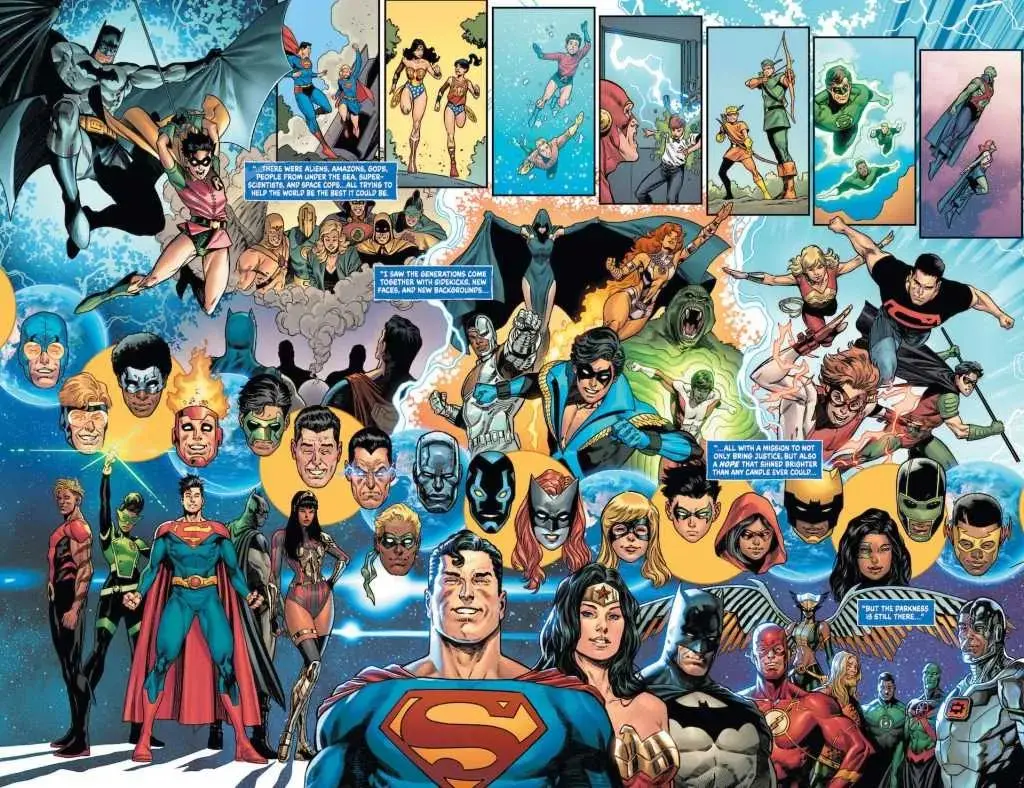
Joshua: All the time. I talk to Daniel (Sampere, the artist of Dark Crisis) probably once or twice a week. We have a standing call and I write little notes in the scripts that are essentially, “I’m sorry, please don’t hate me.” But I also try to find, and this is back to the quiet thing…it’s twofold. I’m always trying to find quiet moments within explosions.
When I’m writing, I think about theater a lot and some of my favorite moments in theater is when suddenly the lights go down and it’s just two characters on the stage. They don’t need anything else. I think David, we talked before, where it’s like they don’t need props, they don’t need a big set, it’s just two actors on the stage acting their asses off. And that’s sometimes when you’re the most invested in it. And I’m always trying to find moments of that.
For the artists, I think it helps because every once in a while I’m like, “It’s just going to be two characters in a dark room for two pages. I promise you won’t have to draw a million things. ” And then I’m like, “I’m sorry, because the next page has 100 characters on it. But these two pages are going to be quiet.”
I think one of the questions I had for you is when you are working on these events, do you have a note for yourself (about that)? Or is it just conscious that you’re like, “I have to find quiet moments in this story.”
Kieron: What you’ve just described I describe as the art budget. People talk about art budget in terms of money.
Joshua: Oh yeah.
Kieron: It’s not the money. It’s about, “Can you break a human being?”
Joshua: At DC, we call them lob pages.
Kieron: Oh yeah.
Joshua: I think Greg Capullo was the person that coined that I think.
Kieron: I did an essay about this. If you remember Young Avengers, as it’s a team book…it’s obviously dense. It’s a lot of dense shit – and then we put the villain in a dimension which is just white backgrounds. And it’s austere. And that’s very clearly like, “Okay, I’m going to kill Jamie in these pages and the other pages it’s going to look cool, but I’m cheating.”
I’m very much about the quiet moments. What I’ve actually done is tried to compress everything else. And this is the real thing I’m doing in terms of, “Okay, how can I buy the quiet moments by cutting other stuff? And what trick can I use to compress?” So, it’s when I’ve been looking at other events and comics generally it’s like, “Okay, what needs space? What is desirable in this space and what are essentially golden extras?”
Especially if people have read Immortal (X-Men) or Eternals. Yes, I do the high drama stuff. But there’s a lot of people having coffee. It’s quite important for me. It might be a difference between Marvel and DC, I think. I’ve said this before, but the idea of the guy on the street corner is important and some part of Judgment Day is just people on the street. I didn’t want to just have the world ending from the superhero’s perspective. I wanted, “Okay. What would I feel right now? Or what would my mate on the phone feel about this?”
And that’s hard in an event, just because of space. I’ve said this before, but the problem of an event is you feel like you are writing the Marvel Universe, which is a different challenge to writing one book. And in my case, I’m writing a lot of the crossovers as well. I’m writing the Eternals issues, Immortal X-Men, and some other tie-ins. I’m writing something like 18 issues in this fucking thing.
But even though this is Eternals and Avengers and X-Men, they’re the main characters, I’m still thinking, “Okay, what’s Doctor Doom doing? What are the Fantastic Four doing?” Because you are writing the whole thing. It doesn’t matter how many issues I could write, it’s the whole Marvel Universe. And then it’s like, “And how do you edit?” And this is like, “Who do you choose as your lead characters? Who are the emotional backbones here?”
And then of course the actual weird advantage of being an event book and I’m writing tie-ins as well and go, “Okay, this plot is interesting, but also coherent and self-contained…I’ll move it to one of the tie-ins.” So, this is the really fun part where it gets unlike anything else. I feel like I’m editing on the fly and I’m pitching my own tie-ins and we have these three specials halfway through to do other stuff. And it’s like, “Oh yeah, there’s always other options here, which wouldn’t be available in any other story than an event.”
Joshua: So, you’re having a very similar experience. I was thinking about when Hickman did Secret Wars, if you only read Secret Wars, you got what you needed. But there was also something about Secret Wars where a lot of times there would be these big action moments that you would hear about or you would see one panel and then it was like, that could possibly be in one of the crossovers, or it was this awesome epic battle. You’re not going to see it anywhere else, but you know what happened and now we’re going to react to it.
Kieron: That’s how Shakespeare does it. (laughs) Remember? That’s how Shakespeare does it. He’s in good company.
Joshua: With this from the beginning, when I was working on the first issue of Infinite Frontier, a lot of that is trying to see it from the point of view of people on the street. We had just done all this stuff with the multiverse, and I wanted to look at, “If people on the street knew there was a multiverse, how would they react to it?” The first act of was to break up these pieces. But yeah, I do the same thing. I’m always trying to buy time.
So, the way I write comics is I actually do a lot of whiteboarding of the issue.
Kieron: Oh, nice.
Joshua: I go through and basically break everything up, making little notes for myself, going through one pass and then I keep on doing it over and over. There are times where I’ll go through, depending on the book, and count how many pages a character is on. Because if they’re the main character I’m like, “Okay, well, if they’ve only been on two pages, there’s a problem.” So you go back through and then I make little notes. Little red notes are me telling myself that sucks and I have to change it, but I go through and I do that.
And that’s where I’m always trying to find out how to buy time. I know I need these big action sequences, these big moments, and these big explosions. But to me, so much of the story is about the relationship between the characters, so I need to show those things. It’s always about buying time, cutting things and being like, “Oh, that two page spread will be so cool. Either I cut it, or I have to cut something over here.”
It really is this constant battle. And then there are cheats where I’m like, “Okay, I need something for issue six and I don’t have room for it in five, but I need these characters to find this thing.” All right. Now I know the plot of one of the one shots. And then I’ll basically write up a document, and then go and talk to those writers. This week I’m talking to (some writers who are) going to write one of the one-shots. I’ll go to them and be like, “This is what you guys do well, so I’m just giving this to you and you can run. All I need you to do is make sure that one character finds that one thing. That’s what I need.”
There’s a part of comics…when it comes to compressing or decompressing, my impulse a lot of times is to try to decompress if I can. But then I’ll go back, and I’ll look at Crisis on Infinite Earths and it’s like every page has almost two scenes in it.
Kieron: Yeah.
Joshua: Every page has so much going on and you start looking at it and you’re like, “How did they do this?” And you start trying to reverse engineer it. I’m going to name drop here for a moment, I had this conversation with Grant…with Grant Morrison a few ago months ago.
Kieron: (laughs) Conversation with Grant. Grant Robinson, my local milkman. (laughs)
Joshua: (laughs)I asked Grant for advice on writing a Crisis, on writing an event and some specific things. And their advice back to me was really fascinating, very helpful and very interesting. And one of the things that they said, you know, but somebody has to say it to you anyway, is they were like, “You have all these pieces and all these things you have to do. Don’t forget yourself. Where are you in this?”
Whenever I go back and look at all the events, I go, and I look at Infinite Crisis. I go and I look at Final Crisis and Zero Hour and all these big events. And I was a consultant on Metal and Death Metal. So going and looking at those, I was involved in those. So, I have their perspective. Are you familiar with the movie Paycheck?
Kieron: No, actually.
Joshua: There’s a Ben Affleck movie called Paycheck. Every once in a while, I wish I could erase my mind of everything I know.
Kieron: Yeah.
Joshua: Just put me in a room where I forget that I’ve read all these events. And I know all the events really well, so it’s hard to just look at it with completely fresh eyes. I think that’s a thing that I find challenging sometimes is when I’m working on the big stories.
Oh, this is a question back to you: Do you ever find yourself, when you’re working on the event, coming across a moment and you’re like, “Either I’m repeating myself or someone did this and I have to now work around it and try to not repeat that.” There are moments where you’re using the same character but you run into that. Do you ever have that and try to work your way out?
Kieron: Actually, you were saying earlier about yourself as a reader…this is I think the closest I get as in, “That doesn’t excite me anymore therefore I’m not doing it.” And I think my to-do list was Captain America’s shield doesn’t get broken, no one picks up Thor’s hammer. The classic big character Marvel beats. “No, I’ve seen them too many times. I’m not going to do that.”
That would be it. Because if you’re doing the big popcorn, punch the air moments, let’s say Miller Moments if you will. If it doesn’t get the pop, it’s pointless, and then it’s just basically pantomime. That’s when I know if it’s tired and I think the flip of it is going back to that original question about events I liked earlier “how did this make you feel?” Then how can I make this one feel like that now?
That’s where you tweak the mix. Grant’s thing is interesting, because I’m almost finishing issue six, so I’ve almost written it all. Which is so weird that it’s almost all written and none of it has come out yet. And I’m writing what I think is the emotional core of the series. And when the characters are in extremis, and this is really…how do I put it…the me of it.
This is deeply me. What’s the point of life and are we fucked anyway? That’s where you head towards. And there’s so much about my work right now is that level of, nihilism is the wrong word, but hoping the nihilists are wrong. But at the same time, not wanting to give fake hope either. That’s very much where my heart is in terms of where we are. What the hell are we going to do about it? What speaks to you as humanity?
And I was doing that and I’m like, “Oh no.” What do we do in dark times? What is the point? And pretty much the first line in the comic is about heroism. So is a book about heroism in that way. And what does heroism even mean? And what does heroism mean in extremis?
I was writing this and, in terms of influences, I’m going to come back to (Jim) Starlin. Starlin, who’s very clearly somebody who is working for their philosophy and relationship with death and art and whatever via the medium of a big purple dude who destroys the galaxy with a finger click. And when I started hitting this kind of personal stuff, I knew I was trying to Do Starlin.
And then of course I return to your problem. This is really an emotional argument between three or four key characters. And they’re not punching each other at this moment, so how am I going to make this event feel epic. And – well, I solve that by it not being the only thing that’s going on. I’ll be cutting between that and the outside. Because there’s a lot of explosions around it, and it’s just a moment when they’re having a genuine heart to heart and they’re trying to get to this. I mean, you’ll note that’s how Return of the Jedi did it, and that’s an event, right?
This becomes, can we come to form a…not consensus, but can we actually justify something? All the way through, there is so much in the book about I have this emotional, philosophical stuff and how do you dramatize it? How do you make it explosive-y?
And to jump back to something else, because you were talking about how much was in Crisis or whatever…I’m very aware of that. And it wouldn’t work without the right artist. This is the thing about Valerio (Schiti, the line artist of A.X.E.: Judgment Day. I was writing some of these scenes thinking, “They’re going to feel cramped or this won’t have enough room to breathe.” And when they’ve come back, Valerio’s made it land.
Because if you’ve got a certain kind of artist, a certain level of detail in a panel, there is more in the panels and the panels are “bigger”, even though they’re the same size. So, if you had a more sparse artist, it feels quicker. And this is straight Understanding Comics stuff. Panels can be dense and take different times depending on what they have in there. But I’m very aware of that.
This makes me think of something from a reader perspective. To me as a reader, events work best when you can see the foundation in the stories that led up to them. And I think for both of your stories, you can see that. Dark Crisis came from Infinite Frontier and Justice League Incarnate and Justice League #75 amongst other things, and Judgment Day stems from the Krakoan Era of the X-Men and my beloved Eternals by you and Esad (Ribic), Kieron. All that’s clear.
The tricky thing is you want them to flow from story, but events are fundamentally meant to be inclusive and new reader friendly, at least to a degree. Somebody could pick an event up and the next thing you know they’re spreading their wings across all the Marvel or DC Universe. That’s part of their whole thing. How do you balance those two sides?
Joshua: I hate to go with the easy answer of info dumps. (laughs) “Here’s the things you need to know.” In Justice League #75, I had this page where it was supposed to be President Superman basically explaining everything that happened in the DCU for an entire year. (laughs) I had this page, and it was just obviously a million word balloons. The art was getting covered, and the editor and I were talking about it and they were just like, “How much of this do they need to know?”
We were going back and forth on how much they need to know, and my original impulse was like, “They need to know all of it.” But then I walk away from my office, I’m hanging out with my kids and I’m just away from work for a moment. And all of a sudden, this line popped into my head, and it was President Superman saying, “There’s so much you need to know, but we don’t have time.”
I ended up taking probably 12 word balloons and turning it into one because of that one line. I went through it because I was like, “Well, do they need to know all this? Do they need to know? They really don’t.” And I think the mistake a lot of people make is trying to talk down to comic book readers or trying to hold their hands too much. I think you have to be able to move and just let them catch up to you sometimes. They will. They’re smart. And if you try to give them too many pieces of a puzzle, they will 100% figure it out. They love doing it. They will figure it out.
So, you need to go into it not being so concerned with, “Are people going to know what’s going on in the story on every little bit and every little piece.” Don’t get me wrong, with Dark Crisis #1, I definitely had Black Adam talk about what happened to him. But after that, it’d be a mistake in the long run. I stopped worrying about making sure everyone had all the information and knew every little bit and piece.
I just told this story I needed to tell and made sure that the characters and the emotional beats are there. If I spend way too much time on that then it becomes a Wikipedia entry. Then it becomes a story about stories and we’re already doing that so often in so many ways. If somebody’s coming into it completely fresh, my hope is they keep up. If you’ve been following it the whole time, there are pieces for you too.
There are weird cheats. I was thinking about this other day about watching The Godfather and how the opening of The Godfather, which is a very long scene, is all at a wedding. We can immediately relate to a wedding. So, you’re already brought into it almost immediately just because it’s at a wedding and obviously the dynamics of the cast, all of that brings you into the world so much. And that world is so rich and so deep and there’s so many moving pieces, but just opening it on the wedding, opening it with someone telling you a story, all that just brings you in.
So, I always try to find those things of just like, “How can I use these characters to just bring you in?” And that’s part of why Dark Crisis #1 opens on the vigil. It essentially opens on a funeral because you can relate to those ideas. That’s how I try to balance it out, but I try not to obsess.
Kieron: That’s interesting. That all seems very familiar. But also, there are so many parts when people pick up a crossover, it’s like, “Who the hell’s that person?”
The first DC Universe book I read was Kingdom Come.
Joshua: Oh really? (laughs)
Kieron: “Who is this person?” (laughs)
Joshua: Yeah.
Kieron: All I really knew was who’s Batman, who’s Wonder Woman, and everything else I can figure out in context. I didn’t know Captain Marvel, but everything about them I needed was there on the page. As you say, people are smart. And part of it is, “Who’s this cool person? They’ve just said something cool. I’m into that now.” The best sales pitch is also just showing them doing their thing.
I think David completely just nailed the problem though. In terms of A.X.E., what I was doing was, “Why don’t people buy into superhero crossovers?” Because it appears to come from nowhere. And this is explicit. I’ve heavily leaned into that this has come from a variety of books. This is explicitly about Krakoan resurrection going public and the world’s response to it. That’s a fundamentally X-Men story. And all the Eternals stuff we’ve been doing, which is you know, that, and it’s also got the Avengers, who are living inside a bloody Celestial. So, it’s all been tied together.
But that it does come from all those stories means there is a lot to introduce to someone to make the story meaningful, even in the bare essentials. And some of it is, “Actually, maybe we can’t skip past.” You’ve got to explain Krakoa, which Jonathan Hickman does in like 80 graphs. We’ve got to do that to a newcomer quickly without using graphs. That’s one thing I decided, no data pages. Let’s not make it feel like one of the other books. I did include a narrator. It’s an embedded narrator, but not The Machine. The narrator is a mystery this time for various reasons. So, I’m using techniques that can add information where I need to. But what the real thing is, “Okay, let’s make the exposition into ammunition,” and all that crap.
What do people need to know? Let’s turn it into drama. For example, Krakoan resurrection. People need to understand what that is otherwise they don’t really understand it. Let’s do this as an attempt to take it down. So we’re doing the Eternals perspective on their attack to trying to kill the resurrection, and that also explains resurrection early on. (laughs)
Helpfully, The Avengers in universe know none of this. They’re the viewpoint characters. So, they, by being detectives and discovering the story in a dramatic way, makes it interesting for people who don’t know it and tense for the readers who do. They’re following because they’re discovering it as the cast, but also, it’s turning to drama because if you know that Sersi is hiding the truth from them, that’s now drama for the people who know Eternals, like, “Can Sersi get out of it?” I’ve been looking for the structure of that issue to both explain everything I need to know whilst also being drama. That’s how I’ve done that.
And it’s weirdly tightly wound, and I’m quite pleased with it. I think it works. So, I’ve gone very much almost… well, I wouldn’t say the opposite way to you, because I certainly don’t explain everything. But cut to what do you really need? How can I turn that into the actual structure? And it’s easy because I said the Avengers are a real boon. Druig in the Eternals’ a real boon.
I’ve got really big hammer devices to tell the fucking story and let you know what’s going on. Yeah, it’s tricky. And of course I’ve got advantage when talking about this stuff, I’ve read yours and you haven’t read mine.
Joshua: I know. Well, I was going to try to catch up on everything. I’m a little behind on Marvel books in general. But I was going to try to catch up on everything this weekend, but instead I ended up reading (the first Once & Future hardcover, Kieron’s BOOM! series with Dan Mora).
Kieron: Hey, that’s the real Avengers. (laughs)
Joshua: This is very good. (laughs) David said, “Oh, Kieron’s going to read some stuff.” And I was like, “Oh, it’s not out yet.” So, I haven’t really been able to read it. I did read this (the A.X.E.: Judgment Day Free Comic Book Day issue). I got this when it came out on Free Comic Book Day.
Kieron: Ah, yeah.
Joshua: I ended up reading all of (Once & Future), which again, is very good. And it is interesting, because it’s fascinating to read Once & Future and then to read A.X.E.. It’s like you are definitely the same writer…but then different. Once & Future breathes so well, and (the Judgment Day FCBD issue) breathes well, but in a different way.
Once & Future essentially has a cast of five people, and then A.X.E. has a cast of three different groups of people. But you’re still able to get these moments of just breathing in here. It’s just so different. It’s very fascinating. When you turn on event mode essentially you turn on, I have a million characters mode and try to find your way through versus you have these few focal points.
Kieron: One of my problems I think as a writer is I overcomplicate. Even Once & Future gets so complicated at points, I lose people. This is my thing. I overwrite and then I simplify. “Edit, darling, edit” is my note to myself. I always have it written above my monitor. “Do you really need this element, Kieron? If not, snip it or move it somewhere.” And some of my favorite bits of A.X.E. are some of the tie-ins because then you cut the cast down and suddenly I’m writing a Tony Stark and a few other people story.
Events as fractal is one of the ideas I want to quickly throw in. I used to think about events as the front pages of the Marvel Universe, in the same way you described Hickman having important Shakespearean stuff happen off panel or in one panel. That’s great, then we zoom in closer and that’s a story by itself. And then you zoom in again and the question of where you’re choosing to put the level of magnification.
If you like World War II, how many stories have seen set around World War II? And you have a top-level story about the battle, or you can go closer. This is the story about the Enigma code or this is the story about Stalingrad? Or is it the story about a love affair between two normal people against the backdrop of war? It depends on how much you magnify.
Joshua: Yeah.
Kieron: And it’s slightly distasteful to use that, but you know what I mean? Events are big and therefore fractal.
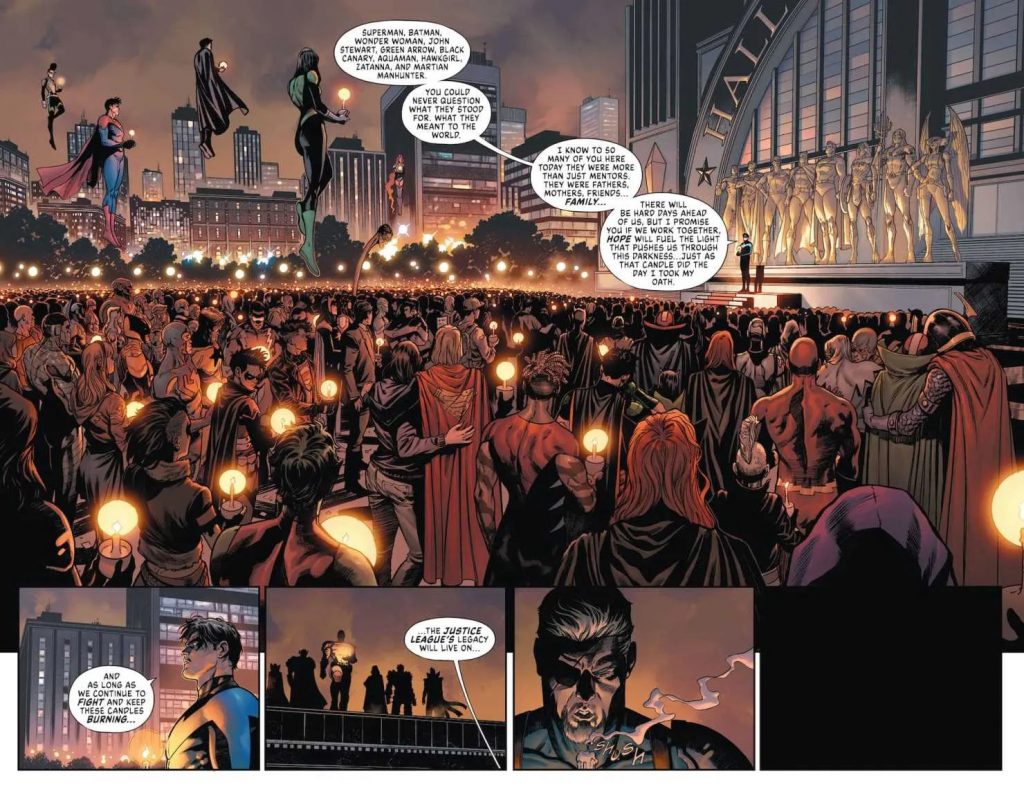
Joshua: It’s funny you had that note of, “do you need it?” The note that I have for myself on everything is “remember to breathe.”
I, as a person, can be very hyper and very on when I need to be, but in my stories, I can be too compressed at times. But whatever I’m looking at, like that whiteboard that I was showing you, I don’t want everything to be beat to beat so quickly, scene to scene. I want to slow down and let those characters breathe within the scenes a little bit more and then let myself breathe too. I know this impacts my dialogue too.
If I feel hurried, the characters will feel hurried as I’m writing them. And I don’t want that. I know that’s when my work, I can tell, I’m like, “Okay, these are the lines that are landing.” And I was thinking about that when I was reading Once & Future, there are moments where I think…whenever the grandma shows up, there’s something about the way you write her.
There’s a confidence to her and a calmness to her that whenever she shows up it’s really interesting. Your dialogue with her, it’s like she’s explaining things. She does do exposition, but she does it in a way that it brings a calmness to the story no matter what’s happening that is very refreshing. It’s very nice in those moments. It makes me wonder when you’re writing her, like your thoughts on writing her. But this is not an event conversation. We could have that talk another time.
Kieron: Which character to say what is always the most interesting. It’s almost like, “Okay, I’ve got 12 people sitting around a table, who’s making that argument?” Four of these five people feel this, but they can’t all say it. Who says it? And it’s normally who feels it strongest.
And in the case of Once & Future, we’ve got this dynamic between boy who knows nothing and a grandma who knows everything, and also isn’t going to tell him everything. And you get Duncan (the boy) to be the reader in some degree and Bridgette (the Grandma) to be the aspirational figure. Once & Future is written pretty directly.
You’re right, I leave a lot more room to breathe quite regularly, even though it’s slightly hyperactive recently. You get stuff like that issue when the nationalist gets shot and bleeds out and you get a very long conversation with him and grandma about death. I was really happy with that. I was like, “Oh no, I can really use space here.”
Joshua: Well, this is a question I have for you. Did you choose your cast? Did you choose, or was there a mandate at Marvel?
Kieron: I just got an email from Tom (Brevoort, Marvel’s Executive Editor) saying, “Hey, we think there’s probably enough meat for an Avengers, X-Men, Eternals event next summer. You got an idea?” It was that simple.
Joshua: Yeah.
Kieron: And then I sat back and I wrote a huge document as is my wont. So, I chose, “These are the characters I think are the emotional backbone of this. This is who I think is the axe of the event.” And then I pitched to the room, and I always remember what (Jonathan Hickman) said…Well, I don’t remember what he said really. It’s the laugh I remember. His amused chuckle.
If you’ve never heard John Hickman’s amused chuckle, it’s a joy. And he says, “Oh, Kieron, you’ve written four times as much stuff as you need as usual, but you’re productive, you’ll be fine.”
And he was right. It’s not like a five-issue mini as was originally planned. What it really is is a six-issue mini and another 12 issues of tie-in or whatever it is. And it’s okay, because the story breaks apart in those modular elements. But that does allow me to go, “Okay, I thought these were the backbones.” Then it’s, “Who are the backbones of the supporting arcs?”
Who comes in in issue #5 and does…I describe it as a Zhukov moment. You know Death of Stalin? Zhukov arrived in the third act and as he arrives, he throws his jacket off, and it’s suddenly like, “Hooray, Zhukov’s here.” And it’s like, “Now you know this is a major character because of that cool entrance.” So yeah, I was given a lot of freedom.
The weird thing is I was already thinking about doing something like AXE in a smaller way in Immortal (X-Men). So, I was already going to do an Eternals versus Immortal war in some way, in a much more low key way. But when Tom asked me, I realized “Oh no, this easily can be the first act of an event.” And then it builds to the second act.
What about you, Joshua?
Joshua: You guys have them as well, but we would have these summits at DC. We’d have these and all these summits would have different things come up. And as I was saying, I would make notes where I’d be like, “Okay, well how would characters react to death now? And how would they react to this?”
Then there were certain things that I became obsessed about. One of them was the idea of sidekicks. I feel like sidekicks are such a DC thing. And it felt for a moment in the past that the word sidekick felt like a dirty word. You go back and look at the New 52, and so much was actually about making the DCU smaller. It was compressing a timeline. It was getting rid of some characters. It was trying to make, what I felt was this beautiful mythology of DC, they were trying to boil everything down to a point where they had lost a lot of stuff.
When I was working there and looking at all these different pieces, I kept finding myself fascinated by the idea that there was this force that wanted to make everything smaller. Instead, they got rid of all this stuff that I think is part of the, this sounds really silly, but the seasoning. It was part of that mythology that made DC special to me, and I think to a lot of people.
I think around the end of 2020, we were wrapping up Death Metal and I was just having these conversations with editorial and talking about what’s next, what were we going to do next? And James (Tynion IV) was very focused on Batman and had ideas for what he wanted to do for Batman. But I was very interested in sidekicks and the growing mythology of DC. And so, I went to them and pitched them a couple different ideas. The original pitch was right after Death Metal had ended, so it was like October, November of 2020. So, I went to them, and I was like, “Here are all of these thoughts.” Not a story just yet, but jumbled thoughts with a thing that I wanted to say.
With Flash I had something I wanted to say about Barry on. With Damien, I had something I wanted to say about Damien. With this it was less about saying something about one specific character. It was saying something about DC as a whole. And then once DC was like, “Okay, we’re interested to hear you out. Let’s talk about what the actual story was.” Then I just took a step back and started thinking about what I want to say about DC, but how do I get there? What are all the moving pieces?
And some of them are going to be painful to get there, I think. But it was like, what am I going to do to get there? But with that, the cast came very organically and actually changed a few times. Again, I knew I wanted it to be about the sidekicks, but I was nervous about using certain characters because I knew there were other people working on those characters where their entire life is about that character.
Like Tom Taylor is writing Nightwing and that is an important book for him, and he’s writing the Jonathan Kent Superman book. Those are books that are important. He’s putting a lot of himself into them. So, for me to be like, “I’m just going to grab two of your characters for a minute and put them over here,” it’s tricky. I started just thinking about the characters, the idea of legacy and the idea of sidekicks, and then people’s perspective on legacy and how I think all of us have different ideas of it.
And then I was like, “Okay, we have all the different ideas of what legacy means to the DCU, and so do the characters in the story. So let’s approach it from that.” It was interesting. As the story was building, it was like, “Okay, well I know I’m going to use Wally. I know I’m going to use some of the new characters like (Jonathan Kent) and Yara (Flor) and Jace (Fox).”
But then it was like, “How do I do a story about sidekicks and not use the first sidekick? How do I not use Nightwing?” Once I realized that, it was like, “Oh, no, it has to be about Nightwing as well as the first sidekick.” Without getting too much into spoilers about the whole story, it’s about what does Nightwing actually represent to the DCU?
Deathstroke, we had talked about early on because he was a Titans villain. Deathstroke is so fascinating because it’s interesting when you have this character that people love as an anti-hero, even though he’s not an anti-hero. He’s a villain. And so, I wanted to explore that idea with him.
Black Adam was the one that surprised me. DC brought him up. They were like, “What if you put Black Adam in this?” And I know why. The book came out in June, Black Adam (the movie) was supposed to come out in June originally. So, there was a bit of, can you use Black Adam? And I was like, “Oh, I don’t know.” We had some different ideas on Black Adam. I wasn’t sure. But once I started really thinking about Black Adam, he oddly became such a crucial character to the whole story. Once I started thinking about his perspective, he took on a very specific role in the book.
So, everything just came organically as I was building the story. As I was building out, it was like, “Okay, who makes the most sense for this? Who actually would feel this and then who represents these pieces?” So, it’s like Hal Jordan represents the idea of being hesitant to have legacy or to build mythology to eventually now where he has this humongous mythology. Nightwing is the first of a building mythology. Black Adam is a character who I think is very conflicted about legacy because his children have died. He has a conflicted idea of, “Is this a good thing or not?” And then you have Deathstroke who hates legacy. He hates the idea of these things growing and the mythology getting bigger. I just kept looking at those pieces and that’s how I was able to build the cast that I built.
Then it became a matter of just making sure everyone has something to do that made sense, and you want to have that emotional arc and change. It’s like the illusion of change, right? Of course, with a crossover book like this, it was just about trying to make sure everyone had an emotional moment. And that’s how I built the cast. Let’s do that. And then it was a lot of meetings, a lot of conversations, lot of Zoom calls. (laughs)
But there are times where I wish that we could have summits again. DC still hasn’t done summits.
Kieron: Yeah. Marvel neither.
Joshua: There were probably certain things about the story that might have moved faster if I’d been in a room with everyone. If you’d been in a room with them, you could’ve whiteboarded in front of everybody and talked about it. For Dark Crisis, it took longer. I got really used to (working with) Scott (Snyder) and James. Like Scott and James and I, we would see each other every four months practically. We would put ourselves in a room and we would map out two years’ worth of stuff over a few days. With this, you have a two hour Zoom meeting here or there. It is just such a weird, fragmented way (to do things).
But yeah, that’s how I figured out the cast. And then how do they impact the story? I think once Black Adam, Hal Jordan, and Nightwing became major pieces, those three characters…the story changes. If you introduce a character to the story and they don’t change the story, then they’re not needed.
The thing that I love about Judgment Day is I can see its roots. There’s Eternals and the excess deviation and the relationship with humanity upon death, and then there’s Krakoa and the immortality and the relationship with humanity on life. There’s that tension there. And then the Avengers are right in the middle because they’re humans, and it’s impossible for them not to get absorbed into this battle because I can’t imagine Eternals and Krakoa are going to be quiet about this. But they also live in a home that is an Eternals God.
I look at that and I can see all those parts there. It’s very clean. It connects organically. That’s one of those tricky things…on the outside, it seems like it’s all planned. I was just talking to Jason Aaron about the Jane Foster Thor story, and he was talking about how one of the biggest beats in the entire story didn’t come together until he was getting pages from the penultimate issue in from Russell Dauterman. Sometimes the magic of comics is that these stories seem like they’re planned the whole time even when they’re not necessarily.
But one of the things I think is interesting about events is what Josh was talking about. Kieron, that is a very clean idea. Everything connects really nicely. But there’s always universal need. What does Marvel need? What does DC need? How much do you have to factor universal need into your story rather than just what’s right for Judgment Day in this case?
Kieron: Regularly people will say, “What’s the get?” That’s something people say in Marvel meetings – it’s the very practical question: “Okay, why are we doing this? What toys do we get out of this thing?”
Joshua: Yeah.
Kieron: So, being around the block a bit, I know what the gets are, so I’m thinking about, “Okay, what is the fun toy that comes out? What’s the status quo that people are going to be able to carry on playing with? “What’s the, “This will never be the same again.” That kind of stuff. But going in, Avengers versus X-Men versus Eternals, that was the cue. That was their need, as in, “We want to do this.” So, me arranging the logical points together to a good starting part was part of it. And then it’s, “Okay, what can I do extra?”
Because them hammering the shit out of each other for five or six issues is not appealing to me or anyone really. We’ve seen that before. You may see things like tweaks I’ve done, like, let’s make the Eternals more clearly the bad guys. That immediately changes the dynamic. And then the second act. Also, the biggest change was where the second act ends, that’s where I was going to end the crossover. And (Marvel editor) Nick Lowe, when I was originally pitching, said, “You can’t do that. It’s got to be this.” And I was like, “No.”
And then I went to edit and was like, “Oh, no, he’s right. This is a Marvel event. We need the implicit third act.” (laughs) And that’s the need, as in, it can’t just be me doing my bullshit. There needs to be a bit where we hit the third act and everything goes third act-y. (laughs)
Joshua: Somebody said this to me recently, “You need your CGI fests.” You need to have your moment. It depends on the book. I get a little leery of it.
I’ve got to a point where in my documents, I literally have a line that is like, “What is the get?” It’s in bold and I spell it out. You know that is a question you’re going to get. “What is next? How does this impact things?” And one of the testaments of a good event is those gets. Where do those gets go and how do they grow without you? There’s that line in Hamilton and I’m going to say it wrong, but I think it’s legacy are the seeds that you don’t get to watch grow.
It’s that idea of that. And I think that’s what we do on these events, part of the fun of the event is to put things on the table and then hope somebody else takes that get and then makes a whole book out of it or makes more story out of it, and you get to just watch it. You get to take a step back and be like, “That thing is awesome. Someone took this thing, one of the gets, and have made something else cool with it.”
We talked about being new reader-friendly with these books, and I think one of the things that certainly helps with that in theory is that both events had introductions released on Free Comic Book Day. They were both excellent at doing what they needed to do. I especially loved The Machine as a narrator, Kieron, but I like how that walked through the mechanics of how all that works. Both of them tell an interesting story, while connecting readers unfamiliar with the story to the pending event. For you two as writers, were those particularly difficult challenges? Because you have to encapsulate the vibe of these events, while also saying why you should read them, because fundamentally, these are marketing tools.
Joshua: Yeah, it is a marketing tool. Free Comic Book Day is a moment where people are coming in to get these books. In theory, a million people or whatever, however many they end up printing, that are going out there to get these free books, they might not ever read another comic book the entire year. They might just pick up that one. You’re aiming for them, but you are also aiming for the people that are coming in weekly, so it’s a weird balance. But also, Free Comic Day is, if you talk to a lot of retailers about it, it’s also for kids, so there’s an interesting element of that too. That’s why, mine, I had it where it was kids were in it. I made it so the kids were the ones that were my exposition machine. They were explaining things, while things were being explained to them.
I was actually looking at yours yesterday, Kieron, and we both did a similar thing, where our first pages were like, here’s some of the important information that you need. A little bit of history, a little bit of the past. Here’s a few different moments in Justice League history on the first page, just to get you to, yes, there’s a history here, and now we’re getting into the new story we’re doing. But I think the thing that I was really working on mine a lot, was just trying to hit all three beats.
If there’re kids that pick this up, if the people that are never going to read another book the entire year pick this up, they get some kind of finished story. So I had a villain in it, and that villain gets defeated. There’s an encased version of a story. And then I also try to hit on those Wednesday people that come in every week who love DC comics. That’s why I picked Wally (West) too. A Flash is somebody so connected to events and because of Wally’s importance to Rebirth, there was a lot of, I hate to call it math, even though I call it math all the time, but there was a lot of math that went into it. I just want to make sure I tell some kind of story that makes you excited about what’s coming, but also could stand alone. Those are the two things I was aiming for.
Kieron: More with my creator-owned work than the stuff with Marvel, but I’m one of the people that I think most regularly have done adverts for comics in comics. I did it for Die, I did it for The Wicked + The Divine, and they’re halfway between a trailer and a teaser. And that kind of very much, “I want to tell the story but I’m very aware this is going to be some kids’ first Marvel comic.” So, I’m like, I want to show Thor hitting something, here’s a giant monster attacking New York. But at the same time, there’s a monkey genocide on page three or whatever (laughs) It’s both what you’re expecting, but also, what the hell is this now?
Joshua: Dude, I love yours. Because I was thinking about this yesterday before we talked where it was like, here’s the history, and then you turned the page and it’s a million years ago. (laughs) It’s like you just dive into it.
Those poor thinky monkeys! All they did was think.
Kieron: Yeah. There’re dangers to thinking. That’s basically the takeaway. All events should have less thinking in it is kind of my subtext.
The actual real sort of problem, here’s a big superhero battle, here’s something weird and interesting, here’s a kind of setup for something, “Oh no there’s going to be a war.” And here’s a big picture at the end, because literally taking two pages out to do a big, just a big Dustin Weaver double page spread. But the real trick of it was the fact we’re coming so much from the stories, as in the two stories are mutant resurrection is revealed in the Hellfire Gala, and the Eternals believe that mutants are deviants. They’re the two real story inciting incidents.
And one of them isn’t revealed when Free Comic Book Day comes out, the mutants are deviant was not revealed in Eternals yet. Instead, in FCBD, I did it as a tease. And the secret to resurrection was not public in the Marvel Universe either. The person on the street in the MU didn’t know until literally this week, seven days before A.X.E. 1 comes out. So I couldn’t tell why A.X.E. is actually happening in FCBD clearly. So, I’ve got to work out a way to say the story’s happening without saying why.
So, I end up doing this thing about this mutant monkey. I’m talking about mutant without really talking about anything to do with our story but using this as a device to sort of dramatically show, “This is the sort of stuff the Eternals do when they’re bad.” And then I show deviation, and the idea of deviation is in there, that they are sort of programmed to do this. I can’t say specifically why the event is actually happening. So I’ve got to find other ways to dramatize why. That was the biggest challenge. That’s why we ended up with a thinky monkey, because I was that thinky monkey. (laughs)
Yeah, because you don’t want to spoil the ending of Eternals #12, right?
Kieron: Exactly.
You know, Josh, I have a question for you…this was something I know Kieron was going to bring up, but you read the Free Comic Book Day issue for Judgment Day. When you read that, do you feel like there’s a material difference between a Marvel event and a DC event?
Joshua: I think the expectations might be different. I look at a lot of the differences between the two events. I think there is, if you make it. If you buy into the expectations of what is a DC event, if you buy into expectations of what is a Marvel event then of course, yes. I won’t lie, we’ve had summits where we’ve talked about an event and then somebody’s been like, “This is like a Marvel event.” That has happened. I’ll just tell you which one was like this. It was like how Shadow War…I remember when we first started talking about Shadow War, which was the Batman, Robin, Deathstroke crossover that we just finished that led into Dark Crisis.
I think when I pitched it was two years ago when I first pitched that crossover. That was definitely one of the conversations. I remember Ben Abernathy, he read the pitch and he was like, “This is like a Marvel event.” I think maybe Marvel events, there’s an expectation, and you can tell me how you feel about this Kieron…it’s going to be more character based. It’s going to be a little more grounded.
And with DC events, there’s this expectation that it’s always going to end up being about some kind of reboot or rewriting of history at a point where now with Dark Crisis, I have to scream at the top of my lungs sometimes just be like, “We’re not rebooting anything. We’re not rewriting anything. It’s not about that at all.” But there’s expectations that we’re going to. It’s not always going to have to be some kind of multiverse event where things are going to get changed. We’re not going to apologize for history being a mess yet again. I think those are the things that go into the expectation and so for me with this event, I was trying my hardest to lean away from it and make it a little more about the characters.
Being very candid with you, I think I have maybe negative feelings about the expectation of what is an event. What do you think Kieron?
Kieron: When I phrased that question, I found myself thinking, if you just look at where events come from, if you ignore Contest of Champions, the founding event is Crisis (on Infinite Earths).
Joshua: Yeah.
Kieron: It’s exactly what we’ve just described. And in some ways the fact, the word crisis hangs around, it does hold DC events. And the founding Marvel event – Secret Wars – was a thing primarily to sell toys. (laughs) So they’re very different. I was chewing over… is that the difference? DC events are like Crisis, and Marvel Events are more lower stakes, character thing? And I don’t think it is, at least entirely. I don’t think you really get the definitive Marvel event until Civil War in the noughties. That’s the one which every Marvel event wants to be.
Joshua: Yeah, I agree.
Kieron: That’s 100% character. With A.X.E., I’ve had the sort of fight against the idea that it’s another hero versus hero event. And I’ve had to sort of say, “if it is, it’s not in the way you think it is.” If it is, it’s kind of pushing against that expectation. I mean, of course the reason why hero versus hero became popular is… the results are uncertain. When you’ve got cynical or a more sophisticated or knowledgeable audience, they know that the villain’s going to lose, aren’t they?
If they want to have the dramatic tension, hero versus hero is one very simple way to do it, because you don’t know who is going to win. Because who’s the good and the bad of it? So you can sort of see why that’s useful. But at the same time for me, it’s like, “No, that’s not what AXE is doing.” Yes, it’s still all going to come from character… But at the same time, it’s not presenting the sides as equally right. You can root for one side without feeling conflicted. I don’t think many people will be rooting for Druig. Possibly not even Druig. (laughs)
Joshua: One of the harder things to do with events is you want to make sure that you feel for whoever that bad guy is. There’s a part of you that has to kind of agree with them. And that’s something I was trying to do with Dark Crisis a bit was to try to find those moments of you might agree with Black Adam. I don’t think you’d ever agree with Deathstroke, but you might agree with Black Adam. I know there are fans that agree with Pariah.
Joshua: I’m trying to think. There have been a lot of hero versus hero events, but not all of Marvel’s are, right? The one that Chip (Zdarsky) just did (Devil’s Reign) was not hero versus hero.
Kieron: This segues to my next question.
There’s one kind of event, which is, I think the comic equivalent of a disaster movie, and for quite a lot of Judgment Day, it is that. It’s a disaster movie. And it’s like that’s cause superheroes is a genre which takes from so many different places and an event, if it’s big enough, buildings start falling down and you’re starting to making it feel like that kind of thing. But the other sort of event, like with Chip’s, but also Original Sin. When Jason (Aaron) did that, it’s an event that basically poses a question to the universe.
An aside: I found myself thinking about the events which kind of give and take. When I say take, it’s like, “We need the other books to buy in to make this feel bigger.” If the world is under attack, everyone has to show the world being under attack. Then there’s the other sort of event, which essentially gives the tie-in books a story prompt.
Joshua, when you were talking last about, here’s a really cool sub plot you can go and do, that’s kind of a, “Here’s something useful.” And in Judgment Day, the first act is the Eternals/X-Men war. And there’s a lot of stories which are great for X-Men books as tie-ins there, as it’s as direct a threat to the mutants as the Sentinels. X-Men Red is as essential as anything else. It almost as essential as the main book. There’s some very cool stuff in X-Men Red and that’s because it’s their story. But then we hit the second act, and the second act becomes much more like Original Sin or Devil’s Reign, where it’s a question that is asked to the whole Marvel universe – and is a prompt for anyone who wants to tie-in. My kind of aim is, “Here’s something very cool. I hope this inspires you. And then you can do a tie in if you want to, and it’ll be additive to your book.”
I don’t need you to do a tie in. I just think you would enjoy it, and can allow you to do a lot of cool things for your book, going forward. It’s very much me thinking, okay, as someone who’s written a lot of tie-in comics… what would I find cool? In the same way as Original Sin was like, you got to do a story about a secret your character has never known until now. You know what I mean? That allowed writers to do a whole bunch of fun stuff. I wanted something like that, but totally different. Something which is big scale, but it’s also personal and that’s, of course, very Marvel.
Joshua: With Dark Crisis, that was something I was thinking about this morning because we had our first tie in one shot come out today, and it was the one that Tom King wrote. And he was the first person I talked to maybe a year ago about doing one of the one-shots. And with him, it was like, I basically put all these toys out on the table, and I put the pieces out and I was like, now you run with these prompts. I’m going to give you simple…Pariah has basically given (characters) happy prisons. And then also, I recognize that Alan Moore’s famously done something similar. So of course I go to Tom and I’m like, don’t do Alan Moore. (laughs) But here’s the pieces, but don’t do what he did…and then run with it.
I can often be a control freak about things. And so with this book in particular, to kind of let go of some of those one shots and say like, “You have an opportunity here. My biggest mandate to you is to put more toys in the table. I’m giving you these pieces. Please try to make more toys with these pieces that I’m giving you.” That’s the only really like heavy mandate to everyone and try to aim a little more character based, a little more personal, a little more emotional. And that’s why Tom did a story about Clark’s happiness prison was his son’s teenage years. That was what he got, but he gets to get that back as well. So there’s kind of a balance there, but he ended up doing every two pages is like the year 13, the year 14, the year 15. It’s really well done.
And when it came to like breaking up the event into certain groups, at some point I kind of know where it’s like, the first act is about what do we do when the Justice League’s gone, handling the realities of it and then what does that mean for us? Like, how much they depend on the Justice League and there’s a line in issue #3 where Black Adam, there’s a moment where one of the characters is like, “Well, the Justice League are going to come back.” This is one of the younger characters. Black Adam is like, “You have to stop waiting for mommy and daddy to save you this time.”
And so it is kind of this idea of the characters having to sort of grow up and then take their own idea of legacy and stop letting people tell them what it is. I always find fascinating about superhero characters, how often people are constantly telling people who those characters are. Everyone has their expectations of who these characters are and what they’re going to do. And I always try to think, “Okay, but what would the character actually want?” That’s sort of what the second act is about them trying to figure out what they actually want.
There’s a scene where Alan Scott is talking to Nightwing, and Nightwing sort of says, this is a spoiler. People haven’t got this far in reading it. Basically, Alan Scott is talking to Nighting about them needing to grow up. Nightwing is like, if you want to lead the Justice League, you do it. And then Alan Scott explains the team names are just labels, Those don’t really matter. None of that matters. You need to actually step up. I don’t care what you call yourself. None of that actually matters. It’s time. You need to figure it out, like what you actually want to do. And then the third act is a lot of fighting because it’s a superhero book. (laughs) There’s a lot of punching, a lot of fighting.
And then me trying to find heavy emotional moments within that fighting, which I think I have found thankfully. I think with this one, I was constantly trying to focus on the ideas of legacy. And then there’s a lot of meta text in there for myself and my experiences at DC. There was definitely a resistance for a long time to anything new. And we talked before about the idea that it felt like sidekick was a bad word. But also new people coming in, there always felt like there was a resistance to that. I just wanted to do a story about that. So, there’s a lot of meta-ness throughout.
But I have a question for you. On our emails, I was joking when I was like, “I want to ask you about the meaning of life,” but this kind of does revolve around that. So for you personally, I’m always fascinated about this question with different creators…for you, what actually matters? When you get to the end of this event, maybe 10 years from now, what would it be for you to measure your event as a success? Like, is it sales? Is it reviews? Is it Twitter love? Is it peer love? Like for you, if you, when you get away from it and you look at this event, what matters to you to say this is a success?
Kieron: Well, I think it’s tricky because I think it’s a moving target. I won’t really know until afterwards, one way or another. It’s like…how do I phrase it? I never realized I wanted to win an Eisner until I didn’t win it. That’s a good way to put it.
Joshua: That’s great.
Kieron: Like when The Wicked + The Divine was nominated, I was very much like, “I want Lumberjanes to win.” And that was my position. And then when we didn’t win, it was like “Oh bollocks, I actually did want to win, shit. I am that shallow.” And you have to face that about yourself. That’s pretty petty because awards are meaningless, you know what I mean?
Joshua: Yeah, I’m fascinated by this. This is something I’ve been thinking about for the last year. Obviously to the publishers, what matters to them, it’s very different. For them, what matters at the end of the day is sales realistically, right? I mean, let’s not kid ourselves. I obsess over sales a lot of times. I definitely look at that and, but it isn’t always the one measuring stick. And so that’s why I was curious for you. My answer is complicated too.
Kieron: I’m going to give you my standard answer now. My standard answer right now is I just want it to be good. I want to be personal. I’m interested in it as a piece of art, I want to sit back and say, “Okay, this is a coherent story that I think I produced under extreme situations and people will enjoy.” That’s my very basic idea. Stuff like sales is out of your hands in some way. It’s not entirely up to you. There’s a real hard limit to how much control I have over that.
I’m old enough now that if it’s beyond my control, I don’t worry. I’ve sort of joked to my friends. I said, “It’s probably a good time to go and do some more creator-owned after this. Because if it sells really well, that’s probably a good time to capitalize on my creator-owned. And if it doesn’t sell well, Marvel won’t want me anymore. Probably best to do some creator-owned.” (laughs)
Joshua: Well, when you do an event, there is a part of you that is like, what is next? What book in the DCU do I do after an event? And yeah, what matters for me… I can be really hard on myself about my own work at times. And that’s why I sometimes fall on the sales, because the sales have no emotion. There’s no opinion about a sale. It’s it did or it didn’t. And obviously there’re ways of manipulating the numbers a little bit, but for the most part it’s like, that’s it. That’s the number.
That’s why I fall toward that a lot of times. But at the end of the day, I have to be happy with the end result because if I’m not happy with it, then I failed completely. You know, it’s like if I at the end of the day I look at it, and I had fun with this, my collaborators and I made something that I feel is special and I’m proud of, then I’m like, “Okay, that’s it.” What matters to me is really that. Because I get to the end and I don’t like it, then, oh man, I screwed up. I can’t control the rest of it.
Kieron: Here’s two thoughts. One of them is, I really just want to be able to look someone in the eye and say: this is worth your time. You’ve made a leap of faith with me. You spent a lot of money on this. If you buy it entirely, I’m not wasting your time. It doesn’t matter if it sells no copies or all the copies, I gave you everything and you could see on the page. And the second one is, I’ll tell you this, I don’t know about you Josh, some of my friends always seem broken by events. Like events are really hard work. They’re tiring and they’re grueling and they often don’t look much fun. That’s at least one reason why I haven’t really pursued one. I thought that looked awful. I kind of want to get through this and be healthy and happy.
I mean, I just finished off first draft issue six today. So before any of it has come out, it’s written, so up to now, the actual production has been quite…not easy. It’s been a lot of work. But it hasn’t broken my spirit or anything. And I think that’s a win, because the emotional health of creators is worthwhile. I’ve enjoyed it even. And so having enjoyed it, I count that as a win too.
Joshua: Yeah. I read that article you did about the rules of an event. And I was surprised at the beginning when it said you hadn’t done one before. I was like, “Is that right? That can’t be right.” You know? But I’m like, no, it’s just the same thing as me. He’s just worked on so many of them. At the beginning of this event, I had a moment, I think it was after I wrote #1, and I think we were already, I had written Justice League #75, I’d done a bunch of pieces for it. And I had a moment where I was like, “This is it. I’m never working on another event after this.” (laughs)
But now I’m writing the ending, and I had a moment last week where I was talking to DC and I was like, “Alright, I know what I want to do next.” I knew what the next event I wanted to do was, and it was like at some point in the process, I think you look at it and you’re like, “Okay, I know what I would do differently next time. I know how I would handle this differently next time.” I think if you get to the end and you’re like, I can do this again. A lot of people do come to events, and they get to the end, they’re frustrated, they’re angry. As of now I don’t feel that way,, I’m like still enjoying it.
Kieron: Since we’re about to end, I’ll give you an incredibly positive quote. The thing I’m kind of holding onto is, once in my life I wrote the entire Marvel Universe at once.
Joshua: Yeah.
Kieron: It’s a privilege and a power. This clearly sounds like I might be pitching to the fans now. It is a real fun thing. You sat down and say okay we’ll have Iron Man talking to Logan and Jean Grey’s going to come in and then I might have Celestial here. You know what I mean? You’re writing the whole universe at once.
Joshua: Oh yeah.
Kieron: It was great.
Joshua: I got a piece of art the other day from Daniel. With Crisis events, you always have two-page spreads that take place in multiple locations in the DCU. In part of (the spread), I had the JSA, the Titans and the Batfamily in the middle walking through the multiverse, that was one panel. And on the side panels, we had shots of the JSA and the Titans saving people and delivering medical supplies and food and seeing kids in a hospital, doing very heroic things. And then I had Cyborg and Mr. Terrific talking about the multiverse. And then I had Nightwing and Alan Scott talking about their role in the DCU.
And that was all in a two-page spread. And I was like, “This is the DCU right here.” It is really fun when you have those moments. I remember when I got the job on the Flash, Ben Abernathy called me that night because I had to fly into Burbank to have a meeting to go over it. Ben was like, “Are you going to celebrate? Are you going to pop champagne?” And I was like, “No, I have to do the dishes and then I have to get to work.” Sometimes we’re so in the zone of the work and you were in it so much that you forget sometimes to take a step back. And like you said, you’re writing a universe. We should be able to appreciate that.
Kieron: Yeah. It’s magic.

